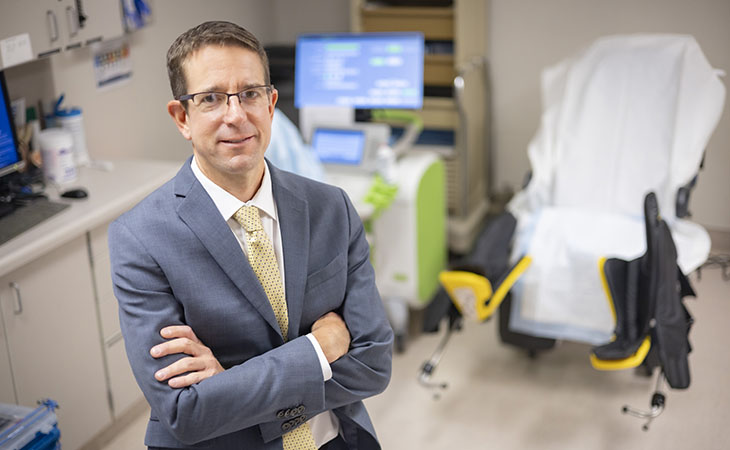Former President Joe Biden’s prostate cancer diagnosis is all too common in men
Disease is not easy to diagnose in early stages due to lack of symptoms
Former President Joe Biden's sudden diagnosis of advanced prostate cancer is unfortunately not as uncommon as you might think. It is estimated that 1 in 8 men will get prostate cancer at some point. Even with routine prostate-specific antigen (PSA) testing, it can be hard to detect prostate cancer. That's because the symptoms of prostate cancer are often silent until it has advanced to a late stage.
Prostate cancer cases are expected to surge in the next 15 years. According to a recent Lancet Commission report on prostate cancer, the number of prostate cancer cases is expected to double between 2020 and 2040.
Marc Dall’Era, chair of the Department of Urologic Surgery, answers questions and shares the latest information about the second-leading cause of death in American males.

Recent studies indicate men could face dramatically higher cancer rates in the future, especially prostate cancer. Is this true? What’s causing this?
Studies suggest that we will see a dramatic rise in men with prostate cancer. As with most things, the reasons are complex and due to many factors. First, it is due to the simple fact that people are living longer. The primary risk factor for prostate cancer is aging.
The other anticipated factor is that, as access to health care improves globally, we will see more screening for prostate cancer and that will translate into higher rates. It is important that access to prostate cancer screening is readily available.
Compared to white people with prostate cancer, Black people are more likely to be diagnosed with prostate cancer and more than twice as likely to die from the disease. Reduced access to prostate-specific antigen (PSA) testing is likely one reason, but there may be other factors. More prostate cancer research is needed to equalize what is considered the largest cancer health disparity that exists.
What can men do to reduce their risk of getting prostate cancer?
Unfortunately, there is not a lot that men can do to prevent prostate cancer. Eating a well-balanced diet and maintaining a healthy weight is the best advice. Exercise, including even simple low-impact activities, are beneficial to overall good health, as well. Men should focus on regular screening and early detection as this can reduce their lifetime risk of dying from prostate cancer.
If there are symptoms, what should you look for?
Urinary problems, including frequency, especially in the middle of the night, or a slow or weak urinary stream are usually signs. These symptoms can often be attributed to other conditions, however. Blood in urine is something to definitely report to your doctor.
Symptoms of advanced stage prostate cancer include pain in the hips and back, indicating it has spread to the bones. There can also be weakness or numbness in the legs and feet due to the cancer pressing on the spinal cord. Unexplained weight loss and fatigue can also be symptoms.
What are the latest advancements in detection?
The field continues to move forward rapidly. New biomarkers are available that help further refine risk of cancer after a man is found to have a rising PSA. Imaging of the prostate with multiparametric MRI and new prostate cancer-specific PET scans also improve diagnosis, staging and treatment decisions.

Are there options for treatment that are showing promise?
We are now offering a leading-edge, non-invasive prostate cancer procedure without a blade, an incision, a scar or any radiation. It is called high-intensity focused ultrasound. The idea is to avoid the risks and the side effects that come with a radical prostatectomy, while reducing time away from work or activities.
The robotic platform, developed by Focal One, removes prostate tissue by focusing high-intensity ultrasound waves only on the affected area. It causes localized heating that destroys the cells in the gland without damaging the healthy surrounding tissue.
Radiation therapy is an important tool for many men with prostate cancer and we continue to see improvements on how this can be delivered safely with fewer side effects. Some men can also safely wait and monitor their disease before having either radiation or surgery.
Current research in genomic testing is also helping to make treatment selection more personal for men with all stages of prostate cancer. While complete cure rates with advanced prostate cancer are disappointingly low, many men are now living for years with our current and emerging treatments.
Does family history play a role in prostate cancer?
Prostate cancer can be hereditary. Men still need better access to germline or hereditary testing to identify those at heightened risk of prostate cancer but also to help guide treatment. Men who are first to have prostate cancer in the family, particularly members with advanced cancer, are at greater risk. It is also important to ask about family members with breast and ovarian cancer, as well as colon and pancreatic cancers. These all can be associated with a higher risk for prostate cancer. We also now have treatments for advanced prostate cancers for some men with hereditary factors.
What do you want men to know?
Talk to your doctor about screening for prostate cancer. If you have prostate cancer, there are always different options for treatment and what is best for one person, may not be best for another. And, if you are diagnosed with prostate cancer, it is often helpful to seek a second opinion, if possible. If you would like to make an appointment at UC Davis Comprehensive Cancer Center, call 916-734-5959 or 800-770-9261.
UC Davis Comprehensive Cancer Center
UC Davis Comprehensive Cancer Center is the only National Cancer Institute-designated center serving the Central Valley and inland Northern California, a region of more than 6 million people. Its specialists provide compassionate, comprehensive care for more than 100,000 adults and children every year and access to more than 200 active clinical trials at any given time. Its innovative research program engages more than 240 scientists at UC Davis who work collaboratively to advance discovery of new tools to diagnose and treat cancer. Patients have access to leading-edge care, including immunotherapy and other targeted treatments. Its Office of Community Outreach and Engagement addresses disparities in cancer outcomes across diverse populations, and the cancer center provides comprehensive education and workforce development programs for the next generation of clinicians and scientists. For more information, visit cancer.ucdavis.edu.




